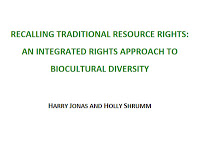
Traditional resource rights (TRRs) are an integrated rights approach developed by Darrell Posey and colleagues in the 1990s. TRRs emerged as the result of an explicitly political legal project to more accurately reflect Indigenous peoples’ and local communities’ views and concerns, and focused on integrating otherwise disparate legal regimes, instruments, and provisions. Posey describes TRRs in the seminal paper Indigenous Peoples and Traditional Resource Rights as constituting “bundles of rights” already widely recognised by international legally and non-legally binding agreements. TRRs, therefore, recognizes the “inextricable link between cultural and biological diversity and sees no contradiction between the human rights of Indigenous and local communities, including the right to development and environmental conservation.”
The paper entitled: ‘Recalling Traditional Resource Rights: An Integrated Rights Approach to Biocultural Diversity’ by Natural Justice’s Harry Jonas and Holly Shrumm provides an overview of the concept and suggests that TRRs are worthy of reengagement and reconceptualization in the current context.
